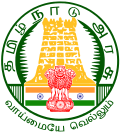Indian General Election
Post the demise of DMK Chief Minister C. N. Annadurai, senior leader and minister M. Karunanidhi assumed charge as Chief Minister of Tamil Nadu in 1969. He decided to form an alliance with the Indian National Congress (R), Communist Party of India, Indian Union Muslim League and All India Forward Bloc for the 1971 Indian general election.
For the 1977 Indian general election, the party formed an alliance with Indian National Congress (Organization) and the Communist Party of India (Marxist) as a part of "Janata Alliance". The alliance won only five seats in the election. [1]
For the 1980 Indian general election, the party formed an alliance with the Indian National Congress and Indian Union Muslim League as a part of "Congress Alliance". The alliance won 37 seats in the election. [2]
For the 1984 Indian general election, the party formed an alliance with Janata Party, Communist Party of India (Marxist), Communist Party of India and Tamil Nadu Congress Party. The alliance won only 2 seats due to a political wave in favour of Indian National Congress following the demise of Indira Gandhi.
For the 1989 Indian general election, the party formed an alliance with Communist Party of India, Communist Party of India (Marxist) and Janata Dal. The alliance won only the Nagapattinam seat. But the new government under V. P. Singh made Murasoli Maran as a cabinet minister for Ministry of Urban Development after his nomination as a Rajya Sabha member [3]
.
For the 1991 Indian general election, the party continued its alliance with Communist Party of India, Communist Party of India (Marxist) and Janata Dal as a part of the National Front. The alliance lost heavily, not winning a single seat. During this election, Rajiv Gandhi was assassinated, when campaigning for Margatham Chandrasekar for the Indian National Congress, in the Sriperumbudur constituency.
For the 1996 Indian general election, the party formed a formidable alliance with Tamil Maanila Congress, a brek away faction from Indian National Congress and Communist Party of India. The alliance bagged all the 39 seats in Tamil Nadu. [4] [5]
For the 1998 Indian general election, the party formed a formidable alliance with Tamil Maanila Congress and Communist Party of India. The alliance bagged only 9 seats in Tamil Nadu. Even though Communist Party of India (Marxist) originally wanted to contest in support of the United Front, it decided to contest alone when only 1 seat (Coimbatore) was offered. After the fallout, Communist Party of India (Marxist) wanted to contest 6 seats in Tamil Nadu on its own, but eventually only contested 2 seats and decided to support DMK-TMC front in the other 37 seats. This was done to keep out the possibility of any vote splitting that might result in National Democratic Alliance gaining seats. [6]
For the 1999 Indian general election, the party formed a formidable alliance with Pattali Makkal Katchi, Bharatiya Janata Party, Marumalarchi Dravida Munnetra Kazhagam, MGR Anna Dravida Munnetra Kazhagam, MGR Kazhagam and Tamizhaga Rajiv Congress. [7] The alliance bagged 26 seats in the election with a large chunk of ministers from Tamil Nadu being appointed in the NDA Ministry. [8]
For the 2004 Indian general election, the party formed a formidable alliance with Indian National Congress, Pattali Makkal Katchi, Indian Union Muslim League, Marumalarchi Dravida Munnetra Kazhagam, Communist Party of India (Marxist), Communist Party of India, Congress Jananayaka Peravai and bagged all the 39 seats. [9]
